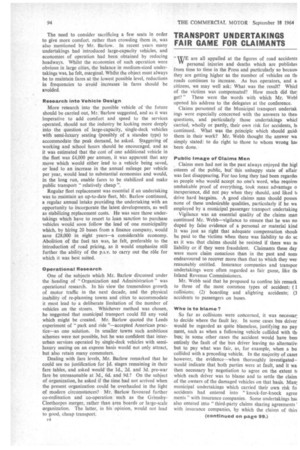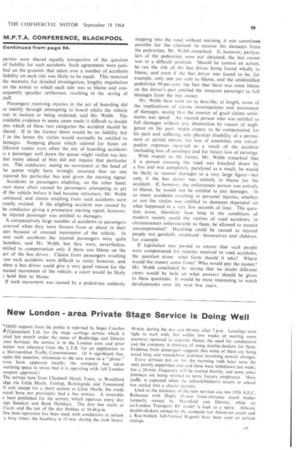TRANSPORT UNDERTAKINGS FAIR GAME FOR CLAIMANTS
Page 96

Page 101

If you've noticed an error in this article please click here to report it so we can fix it.
" WE are all appalled at the figures of road accidents " personal injuries and deaths which are publishet from time to time in the Press and particularly so becaus( they are getting higher as the number of vehicles on till roads continues to increase. As bus operators, and a. citizens, we may well ask: What was the result? Whicl of the victims was compensated? How much did the get?" These were the words with which Mr. Webl opened his address to the delegates at the conference.
Claims personnel of the Municipal transport undertak ings were especially concerned with the answers to thesi questions, and particularly those undertakings whicl carried, wholly or partly, their own risk for accidents, 134 continued. What was the principle which should guid, them in their work? Mr. Webb thought the answer wa simply stated: to do right to those to whom wrong ha4 been done.
Public Image of Claims Men
Claims men had not in the past always enjoyed the higl esteem of the public, but.' this unhappy state of affair was fast disappearing. For too long they had been regarde( as people who would accept no one's word, who require( unshakable proof of everything, took mean advantage o inexperience, did not pay when they should, and liked t( drive hard bargains. -A good claims man should posses none of these undesirable qualities, particularly if he wa employed by a municipal passenger transport undertaking Vigilance was an essential quality of the claims man continued Mr. Webb—vigilance to ensure that he was no duped by false evidence of a personal or material kind It was just as right that adequate compensation shoul( be paid to the victims when there was liability to do se as it was that claims should be resisted if there was or liability or if they were fraudulent. Claimants these day were more claim conscious than in the past and semi endeavoured to recover more than that to which they wen reasonably entitled. Insurance companies and transpor undertakings were often regarded as fair game, like thi Inland Revenue Commissioners.
Mr. Webb said that he proposed to confine his remark to three of the most common types of accident: ( collisions; (2) boarding and alighting accidents; (3 accidents to passengers on buses.
Who is to blame ?
So far as collisions were concerned, it was necessar] to decide where the fault lay. In some cases bus driver would be regarded as quite blameless, justifying no pay merit, such as when a following vehicle collided with till bus; in some other cases the accident would have beer entirely the fault of the bus driver leaving no alternativi but to pay what was fair, as, for example, when a bu. collided with a preceding vehicle. In the majority of cases however, the evidence—when thoroughly investigated— would indicate that both parties were at fault, and it wa then necessary by negotiation to agree on the extent tt which each driver was to blame and to settle the claim. of the owners of the damaged vehicles on that basis. Man; municipal undertakings which carried their own risk fo accidents had entered into "knock-for-knock agree ments " with insurance companies. Some undertakings ha( also entered into "third-party claims sharing agreements ' with insurance companies, by which the claims of thirt
parties were shared equally irrespective of the question of liability for such accidents. Such agreements were justified on the grounds that taken over a number of accidents liability on each side was likely to be equal. This removed the necessity for detailed investigation, lengthy negotiation on the extent to which each side was to blame and consequently speedier settlement, resulting in the saving of staff.
Passengers receiving injuries in the act of boarding did ;o mainly through attempting to board whilst the vehicle was in motion or being restarted, said Mr. Webb. The tvailable evidence in many cases made it difficult to decide nto which of these two categories the accident should be 'laced. If in the former there would be no liability but f in the lattter the victim would normally be entitled to lamages. Stopping places which catered for buses on Efferent routes were often the site of boarding accidents ts a passenger well down the queue might realize too late hat many ahead of him did not require that particular ms. The conductor, seeing no movement at the head of he queue might have wrongly assumed that no one cquired his particular bus and given the starting signal.
Accidents to passengers alighting, on the other hand, vere more often caused by passengers attempting to get ■ ff the vehicle before it had become stationary, Mr. Webb ontinued, and claims resulting from such accidents were 'Rally resisted. lithe alighting accident was caused by he conductor giving a premature starting signal, however, he injured passenger was entitled to damages.
A comparatively large number of accidents to passengers ccurred when they were thrown from or about in their eats because of unusual movement of the vehicle. In lost such accidents the injured passengers were quite tameless, said Mr. Webb, but they were, nevertheless, ntitled to compensation only if there was blame on the art of the bus driver. Claims from passengers resulting 7om such accidents were difficult to resist, however, and nless a bus driver could give a very good reason for the nusual movement of the vehicle, a court would be likely ) hold him to blame.
If such movement was caused by a pedestrian suddenly stepping into the road without warning, it was sometimes possible for the claimant to recover his damages from the pedestrian, Mr. Webb remarked. If, however, particulars of the pedestrian were not obtained, the bus owner was in a difficult position. Should he contest an action, he ran the risk of the bus driver being found wholly to blame, and even if the bus driver was found to be, for example, only one per cent to blame, and the unidentified pedestrian 99 per cent, the fact that there was some blame on the driver's part entitled the innocent passenger to full damages from the bus owner.
Mr. Webb then went on to describe, at length, some of the implications of claims investigations and assessment of damages, saying that the essence of good claims settlements was speed. An injured person who was entitled to full damages without any diminution by reason of negligence on his part. might expect to be compensated for his pain and suffering, any physical disability of a permanent or partial nature, for loss of amenities, any out-ofpocket expenses incurred as a result of the accident (including loss of earnings) and for future loss of earnings.
With respect to the future, Mr. Webb remarked that if a person crossing the road was knocked down by a bus and was completely paralysed as a result, he would be likely to recover damages to a very large figure—hut only if the bus driver was entirely to blame for the accident. If, however, the unfortunate person was entirely to blame, he would not be entitled to any damages. In so many accidents resulting in personal injuries, whether or not the victim was entitled to damages depended on what happened in a very few seconds of time. The question arose, therefore -how long in the conditions of modern society could the victims of road accidents, in circumstances unfavourable to them, be allowed to remain uncompensated'? Hardship could be caused to injured people not gainfully employed—housewives and children, for example.
If legislation was passed to ensure that such people were compensated for injuries received in road accidents, the question arosewhat form should it take? Where would the money comefrom? Who would pay the money'? Mr. Webb concluded by saying that no doubt different views would be held on what answers should be given to these questions. It would be most interesting to watch developments over the next few years.


































































































































































































































































